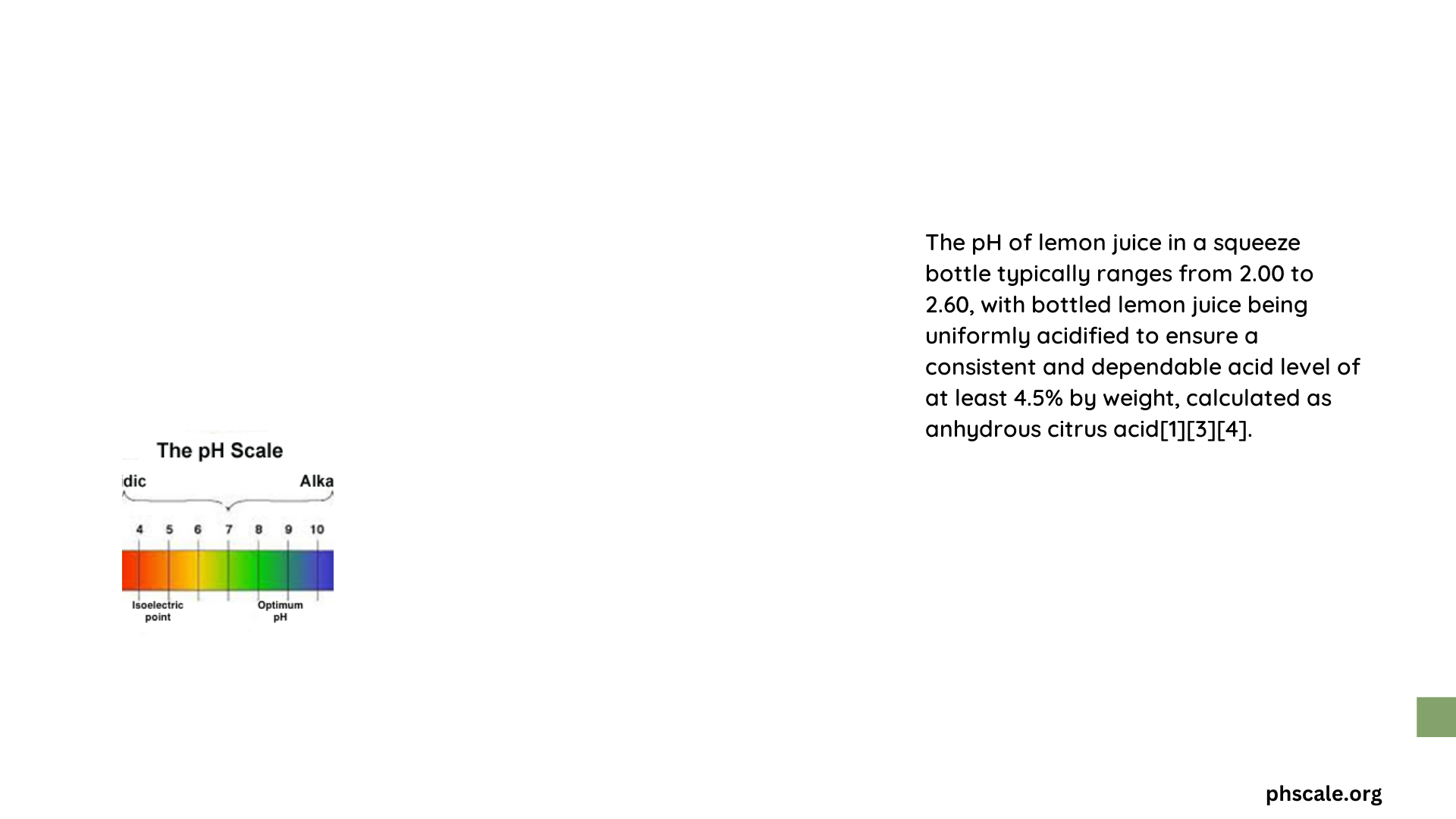Lemon juice in squeeze bottles is a convenient and widely used product with a standardized pH level. The pH of bottled lemon juice typically ranges from 2.0 to 2.6, making it highly acidic. This acidity is crucial for food preservation and canning processes. Squeeze bottle packaging helps maintain the juice’s pH stability and extends its shelf life while preserving nutritional content.
What is the pH of Lemon Juice in Squeeze Bottles?
The pH of lemon juice in squeeze bottles is typically between 2.0 and 2.6. This range is consistent due to FDA regulations requiring bottled lemon juice to have a titratable acidity content of not less than 4.5 percent by weight, calculated as anhydrous citrus acid. This standardization ensures that the acidity remains constant, which is essential for various culinary and preservation applications.
How Does Squeeze Bottle Packaging Affect Lemon Juice pH?

Squeeze bottle packaging plays a significant role in maintaining the pH stability of lemon juice:
- Protection from external factors
- Minimized air exposure
- Light shielding
- Contamination prevention
These factors contribute to preserving the juice’s acidity and overall quality for extended periods.
Why is pH Important for Bottled Lemon Juice?
The pH of bottled lemon juice is crucial for several reasons:
- Food Safety: The low pH inhibits bacterial growth, making it safe for consumption and food preservation.
- Canning and Preserving: Consistent acidity is essential for reliable canning results.
- Flavor Profile: The acidic pH contributes to the characteristic tangy taste of lemon juice.
- Chemical Reactions: In cooking and baking, the acidity affects various chemical processes.
How Does Bottled Lemon Juice pH Compare to Fresh Lemon Juice?
| Aspect | Bottled Lemon Juice | Fresh Lemon Juice |
|---|---|---|
| pH Range | 2.0 – 2.6 | 2.0 – 2.6 (more variable) |
| Consistency | Highly consistent | Varies based on factors |
| Factors Affecting pH | Standardized production | Lemon variety, climate, soil, etc. |
| Reliability for Canning | More reliable | Less reliable |
While both have similar pH ranges, bottled lemon juice offers more consistency, making it preferable for canning and preservation purposes.
What Factors Influence the pH of Lemon Juice in Squeeze Bottles?
Several factors can influence the pH of lemon juice in squeeze bottles:
- Production process
- Storage conditions
- Additives and preservatives
- Packaging material
- Time since bottling
Manufacturers carefully control these factors to maintain the required pH level and ensure product quality.
How Does Temperature Affect the pH of Bottled Lemon Juice?
Temperature can have a significant impact on the pH of bottled lemon juice:
- Refrigeration: Helps maintain pH stability and extends shelf life.
- Room Temperature: May lead to faster degradation and potential pH changes.
- Heat Exposure: Can cause accelerated breakdown of acids and alter pH.
It’s recommended to store bottled lemon juice in the refrigerator to preserve its acidity and overall quality.
What are the Nutritional Implications of Lemon Juice pH in Squeeze Bottles?
The pH of lemon juice in squeeze bottles has several nutritional implications:
- Vitamin C Preservation: The acidic environment helps preserve vitamin C content.
- Mineral Availability: Low pH can affect the bioavailability of certain minerals.
- Digestive Impact: The acidity can influence digestion and nutrient absorption.
- Antioxidant Properties: The acidic nature contributes to the juice’s antioxidant effects.
Understanding these implications can help consumers make informed choices about using bottled lemon juice in their diet.
How Does the pH of Bottled Lemon Juice Affect Its Use in Cooking?
The consistent pH of bottled lemon juice affects its culinary applications:
- Marinades: Reliable acidity for tenderizing meats
- Baking: Consistent results in recipes requiring acid reactions
- Preserving: Dependable pH for pickling and canning
- Flavor Balancing: Predictable tartness for adjusting dish flavors
Chefs and home cooks can rely on the standardized acidity for consistent results in various recipes.
What are the Safety Considerations Related to Lemon Juice pH in Squeeze Bottles?
Safety considerations related to the pH of lemon juice in squeeze bottles include:
- Bacterial Growth Prevention: The low pH inhibits harmful microorganism growth.
- Chemical Interactions: Acidic pH may react with certain packaging materials over time.
- Dental Health: Frequent consumption of highly acidic juice can affect tooth enamel.
- Skin Sensitivity: Direct contact with high-acidity juice may cause skin irritation.
Users should be aware of these factors when handling and consuming bottled lemon juice.
How Can Consumers Verify the pH of Lemon Juice in Squeeze Bottles?
Consumers can verify the pH of lemon juice in squeeze bottles through several methods:
- Use pH test strips or a digital pH meter
- Check the product label for acidity information
- Contact the manufacturer for specific pH data
- Look for signs of spoilage that might indicate pH changes
Regular testing can ensure the juice maintains its expected acidity level throughout its shelf life.
Reference:
1. The Acidity of Lemons and Home Canning
2. The Case for Bottled Lemon Juice in Canning
3. Canning 101: Why Recipes Call for Bottled Lemon Juice
